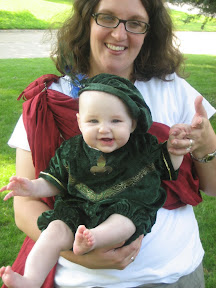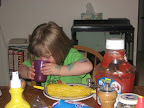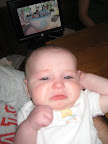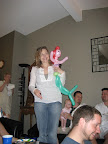I have always liked my hair, even though brown hair isn't quite as glamorous or exotic as some other options. My hair is soft, full, thick, and healthy. One of my favorite things about it are the strands of bright copper that are sprinkled throughout my hair, visible only in certain light. They look metallic, more like copper tinsel than human hair, but the same texture as the rest of my head.
Lately, the copper strands have been matched and are quickly being out-paced by the development of pure, shocking white strands. The white hairs are more wirey, curlier, and just as metallic-looking as the copper strands. I am trying to embrace this, but am failing.
Another natural part of aging is becoming one's mother. We all become our mothers, it is said, and I've been rather looking forward to it. My mother has spent her life trying not to be her own mother, and has had some terrific successes.
If I become my mother, I will be thin and fit, running several miles several times a week. If I become my mother, I will be able to manage a budget and get straight A's in grad school while running a household. If I become my mother, I will be an excellent mother. I will approach motherhood like any other high-powered career, preparing the each day's activities in advance.
When my children are bored, I will have wonderful, creative activities for them to do. My children will brag about me and share stories of the things I've done for them for years to come. Who wouldn't want to be my mother?
But as my mother ages, I think she's changing.
Did she used to just hide her feelings from us, or has she always been so negative, critical and judgemental?
One of the things we tease my mom about is her willingness - almost eagerness! - to accept any discomfort to avoid telling anyone what she really thinks. Martyrdom suites her. But lately . . .
"You have to do this with your daughters."
"You're crazy to do that with your daughters."
"Sarahlynn, that's horrible! You sound like my mother!"
Ack.
My mom was a special education teacher. A learning disabilities resource room teacher, to be exact. Then she became a school diagnostician, the person who tests kids for inclusion in various special ed services. And now she's a school psychologist, and spends lots of her time in meetings with school officials and parents, trying to find the right diagnosis and educational solution for each child.
She's becoming increasingly bitter, and, especially given the communities she serves, I can imagine the tendency toward burn-out for people in her job.
Still, I was stunned recently when she expressed frustration at the mothers who work jobs that keep them out of the home in the late afternoons/evenings, especially when the kids don't have a great dad at home to help raise them.
"When the kids are young, you just find a different job," she said. "I don't care how; you just do it. There are things more important than money." Among the unacceptable jobs some of the mothers had were waitress and school custodian.
Wow. This is my mom, the liberal from a large extended family of liberals, most of whom choose jobs (clergy, social work, teaching) based on helping people, rather than making vast sums of money. These are people who are usually so sympathetic, who see the various sides of a problem, who go (almost too far) out of their ways not to be judgemental. It's . . . stunning to see how she's aging, and, yet, almost inevitable.
She used to lecture me about the mind being like a steel trap, tending to close tighter and tighter as we age, so that we must work ever harder to keep it open.
My mom's hair used to be such a dark brown that it looked nearly black. It's pure white now, and she looks exhausted. I hope that I'm in a position, as I age, to indulge myself with things I love to do, things that energize me, rather than feeling tethered to things that hurt and exhaust me.
As much as I love and admire her, perhaps I don't want to become my mother after all. I might even dye my hair.















